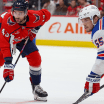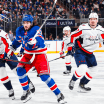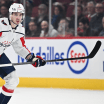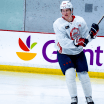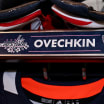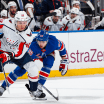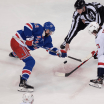Caps Embrace Rematch with Pens
Eager to atone for last spring's second-round loss to the Penguins, the Caps are ready to face the challenge of taking on the defending champs.
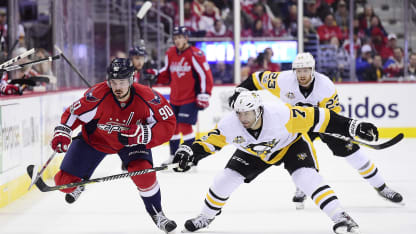
© Patrick McDermott/Getty Images
It's been 351 days since the Pittsburgh Penguins eliminated the Washington Capitals from the 2016 Stanley Cup playoffs, sending them home for the summer on a Patric Hornqvist overtime goal in Game 6 in Pittsburgh last May 10. Since that anguishing moment, the Caps have been eagerly waiting for a chance at redemption, and that chance finally comes on Thursday night when Washington hosts Pittsburgh in Game 1 of the second-round 2017 Stanley Cup playoff series between the two teams.
"We were disappointed last year," says Caps center Nicklas Backstrom, "and the first thing you thought was about coming back and playing them again. So, here we are. It's maybe not a surprise, but it's going to be a good matchup. They're a good team and they're the Stanley Cup champs. It will be a really good match, and we're excited about it."
The Caps (118 points) and the Pens (111 points) were the two best teams in the league during the 2016-17 regular season, but the distance between them in points (seven) is the greatest of any two teams going head-to-head in the second round. Pittsburgh led the NHL with 278 goals during the regular season, and Washington was the league's best team at goal prevention, permitting just 177 on the season.
Washington and Pittsburgh met four times during the regular season, and they combined for a whopping total of 34 goals in those games, including nine on the power play. In the most recent of those regular season meetings, the Caps led 3-0 early in the second period, only to surrender six goals in that middle frame en route to an overtime loss in a wild and wooly 8-7 affair.
Last spring, the Caps won Game 1 over the Penguins in overtime at Verizon Center, taking a 1-0 series lead thanks to a T.J. Oshie hat trick on a night in which they did not necessarily play their best hockey. But the Caps dropped four of the next five, two of them in overtime. All four Washington losses in the series came by the margin of a single goal.
The Pens went on to win the Stanley Cup, prevailing over the San Jose Sharks in a six-game Cup final series.
"You don't have to look back at what happened last year, you just have to look forward," says Caps captain Alex Ovechkin. "It's a big opportunity for us to beat the Stanley Cup champion and play the next team in the third round. Obviously, we've never done it before. It's a big opportunity for us to move forward and get success."
The Caps use that word "opportunity" quite frequently in reference to this series against the Penguins. Washington earned the opportunity to face the Pens again by finishing with the league's best record for the second straight season. Washington believes it let an opportunity slip away in that second-round series last spring, and the Capitals are determined to learn from what went wrong last May, and to do everything possible to ensure success this time around.
During the 2016-17 regular season, the Caps set a franchise record with 32 home ice victories in 41 games. But in recent springs, Washington has not been as assertive as it can be at Verizon Center in the playoffs.
"Hopefully, we've learned that we need to score more goals than them," jokes Backstrom. "Hockey's a tough sport. Last year, I thought it could have gone the other way, too, even if it was six games. It's just tight games out there and small margins out there.
"Hopefully this year, we can come out a little harder from the start. I thought maybe they outplayed us a little bit in Game 1, even if we won it, and [in Game] 2. We've got to come out with a better start and really take advantage of the home ice here from the beginning."
Both the Caps and the Pens are returning largely the same rosters as they had for last May's battle. Washington has added forwards Brett Connolly and Lars Eller last summer and defensemen Kevin Shattenkirk at the trade deadline while the Pens added defensemen Ron Hainsey and Mark Streit at of the deadline. Streit has been a healthy scratch thus far in the postseason.
The Pens have also worked rookie Jake Guentzel into their lineup this season, to good effect. Playing on a line with Sidney Crosby, Guentzel put up 16 goals and 33 points in 40 regular season contests, and he led Pittsburgh with five goals in the team's first round series against Columbus.
Washington got through the first round with a six-game series win over the Toronto Maple Leafs. All six games were decided by a single goal, and five of them required overtime, a Caps franchise record for a single series. Marcus Johansson's overtime game-winner in Sunday's Game 6 in Toronto sealed the deal and settled the Caps' second-round date with the Penguins.
Pittsburgh ousted Columbus in five games in the first round, winning three straight before shedding the Blue Jackets a week ago in Game 5 in Pittsburgh. The Pens lost goaltender Matt Murray to a lower body injury suffered in warm-ups before Game 1 of the Columbus series on April 12. Fortunately for the Penguins, they just happened to have the supreme luxury of a Cup-winning goaltender as their backup.
Marc-Andre Fleury stepped in for Murray on short notice and won four of five games against Columbus, stopping 181 of the 194 shots he faced to forge a .933 save pct. That's the fourth best mark among the eight surviving starting goaltenders as the second round gets underway. Fleury helped lead the Pens to a Cup championship in 2009.
"We've been very fortunate to have two world class goaltenders all season long," says Penguins defenseman Ian Cole. "And yes, everyone was a little worried when Murr went out. They see him leave, and they're like, 'Whoa, what is that about?' But everyone in this room had confidence in Marc-Andre to step in and put together the performance that he did in round one. Everyone knows that he's a world class goaltender, an elite goaltender who can step up and win games for you, and he very much did that for us. He gave us a chance to win every single game, and we're very fortunate that we have right now Marc and when Murr comes back, two world class goaltenders."
Pittsburgh will also be playing without defenseman Kris Letang, who is out for the remainder of the playoffs after undergoing neck surgery. Letang averaged 25:31 per night in ice time during the regular season, seventh in the league. With their top right-handed defenseman - and top offense-producing defenseman on the sidelines - the Pens are playing with five lefties, and they've tightened the workload considerably among the six regular blueliners.
In the Pens' first-round series against Columbus, lone remaining right-hander Justin Schultz led Pittsburgh defensemen with an average of 21:16 per night. With an average of 19:44 per night, rearguards Hainsey and Brian Dumolin were at the opposite end of that ice time spectrum. Just 92 seconds separates the six Pens defensemen in average ice time, indicating the coaching staff has a high level of trust in all six.
Pittsburgh had no difficulty scoring goals in Letang's absence; it scored at least three goals in all five games against the Jackets. The Pens are averaging 4.2 goals per game in the postseason, tops in the league. Washington faced another prolific offensive club with a great deal of team speed in the first round, and the Caps are hoping the six games they played against the Maple Leafs will help prepare them for what's ahead against Pittsburgh.
"I think the Penguins are a high pressure team with their skating and their speed," says Caps coach Barry Trotz. "They pressure on the forecheck, they try to create turnovers, 50/50 pucks, and they turn that into [scoring] opportunities. And that's sort of what Toronto does; they're a high-pressure team as well.
"They're going to be ready. They're the champs. Until someone knocks them off, they're the champs. I thought they had a terrific year. To me, I think that [Pens coach] Mike Sullivan did an outstanding job this year. They had a number of injuries and they still kept that team afloat. They had seven, eight guys out at a time, and that team was battling us for the Presidents' Trophy, really, right to the end. They're a deep team."
With Game 1 still on the horizon, there is still more respect than rancor between the two Metropolitan Division rivals.
"Washington is a very good team as well," says Sullivan. "They've got a good forecheck, they're a good forechecking team, they create offense off the rush, they've got some dynamic forwards in their lineup, and we're going to have to be aware of when they're on the ice.
"As far as our preparation is concerned, I don't think it really changes the type of game or way we want to play. Our challenge is to do our best to dictate the terms out there and get to our game, consistently. And that's what we've got to try to do. We've got to try to get to our game and play the type of game that gives the Penguins the best chance to be successful, regardless of who that opponent is.
"Not that we're not preparing for some of the differences in tendencies that our team has to be aware of and our players have to be aware of. For sure we're gong to prepare our team for that type of stuff, but our main focus has always been on our team and how we have to play in order to be successful."
Second chances don't always come along in life, so the opportunity to atone for last spring's loss to the Pens is one the Caps have expected, and one they now embrace.
"To be honest with you, it doesn't matter which team you're going to play against," says Ovechkin. "It's the playoffs. You fight and you have to win four games to move forward. You just have to prepare mentally.
"Because we don't have success against them - we played against them twice in the playoffs and we don't have success; we lost in Game 6 and in Game 7 - you just have to move forward. You don't have to be afraid. You know you are playing against the Stanley Cup champion and they are a very good team. But so are we. We know this battle has to be done if we're going to get success."
This spring marks the Capitals' 27th postseason voyage since they entered the league as a sad sack expansion team in 1974. Pittsburgh has been responsible for eight of Washington's previous 26 playoff exits, and the Caps are seeking to move beyond the second round for the third time in their history; they advanced to the conference final in 1990 and to the Cup final in 1998.
"We didn't have that much adversity this year," says Caps center Jay Beagle, "but I think as a group we've had adversity - this core group - over the last five of six years, really. So it's something that you're just learning from and growing from.
"This team has grown a lot this year, together. We're really just more focused and we just want to make the most of an opportunity that we know isn't going to be here forever, is having this core group together forever. As you get older, you start to realize how special it is to have a group like this together. So realizing that this is our time and our moment and that nothing was going to stand in our way, and that's what we did in the first series, just overcame a lot of adversity in pushing through that."
The trick now is to do that three more times.

